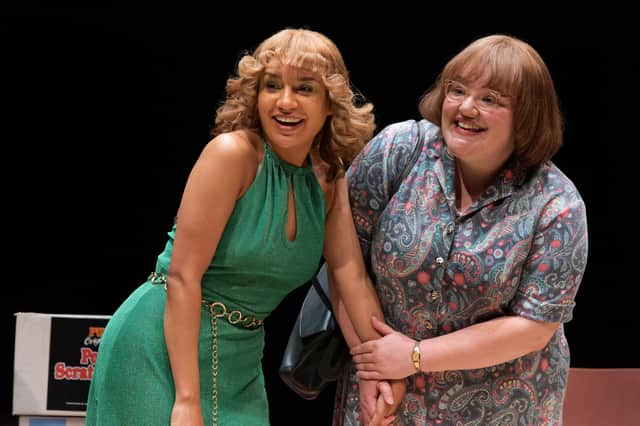THEATRE REVIEW: Talent at Sheffield Crucible


VICTORIA Wood's talent knew no bounds.
Here, in her first play - commissioned by the Crucible in 1978 - she shows her early ability for capturing the lives of working-class women.
Being back in the theatre was exciting, but so different. The buzz was missing as we took our seats, masked and distanced.
The stage - golden silk sheets later removed to reveal a seedy club dressing room - was set by a singer (Daniel Crossley) in a fine comic creation, evoking the era of naff suits, tight trousers, cheesy songs and gyrating hips.
Meanwhile, above us, a pianist is clearly assuming the recognisable Victoria Wood role on a white grand piano.
It's talent night and Lucie Shorthouse is likeable as young wannabe singer Julie Stephens, rattling through Wood's trademark one-liners with friend Maureen as her put-upon foil in echoes of the music hall.
Shorthouse's lively energy brings warmth as she works hard to establish the character. Her lines and Janet Bird's dingy set are scattered with 70s references.
Jamie-Rose Monk as Maureen brings a serious, touching sadness to the part once played by Wood - calling herself "big boned" and scarred by lack self-esteem.
James Quinn is a delight as the comic magician, alongside his pal Richard Cant, as Arthur, with their Lancashire twang bringing to mind comedians of the past.
Crossley returns as the venal compere, a gross sexual predator, showing why we needed a Me Too movement back then.
Julie's teenage sex exploitation by an older man Mel, played by Jonathon Ojinnaka, is also revealed before her dreams finally come crashing down.
The play - with songs - is of its time, but director Paul Foster and a great cast ensure it still speaks to millions of ordinary women.
Written four years after Wood auditioned for and won New Faces it may not hit the dazzling heights of her vast output, but it shows why she is so sadly missed.